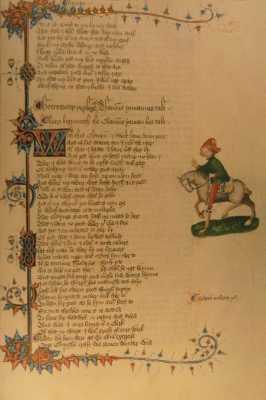History Witch: Uncovering Magical Antiquity
Want to know about real magic from history? This is the place. Here we explore primary texts and historical accounts from the past.
Disreputable English Magic
To assuage the sadness of knowing there is no more Jonathan Strange & Mr Norrell to come (or perhaps there is a but a long way off), I have been thinking about how English magic did fall into disrepute so that a man of Norrell's character found it necessary to make it respectable once more. One of the first examples to occur to me is Chaucer's Canon's Yeoman's Tale (hereafter CYT because I will tire of spelling it out).
CYT features one of the belated arrivals to pilgrimage in The Canterbury Tales. The canon and his yeoman catch up to the pilgrims and the yeoman launches into a recital of the canon's alchemical life that soon makes his boss leave in a huff. The yeoman takes this opportunity to show that the canon is a scoundrel in this 'elvysshe craft' known as alchemy.
[A note about elves vs. fairies, as Mr Norrell sees the latter as much more problematic. Elves were usually not visible to the naked eye. In the early Middle Ages their effects were often unfortunate, especially with regard to sickness and there are many charms to heal people or animals that had been 'elf-shot'. Fairies were more popular later, particularly in the romances, where they were like humans but not human. Pluto was portrayed as a fairy king when he stole Sir Orfeo's queen and Lanval's lovely disappearing lady was also a fairy. Charming, but not to be trusted!]
Just as Chaucer went to pains to say not all canons were like the one in the story, he seemed to think alchemy had some useful knowledge, but it was prone to abuse by the unscrupulous and the greedy. For while the yeoman claims that the alchemist can 'pave [Canterbury] al of silver and of gold' he also mentions that they live where thieves and robbers do. Harry Bailey, the host of the pilgrims, asks why the canon is dressed in ragged and dirt clothes if he's so brilliant and the yeoman admits,
For whan a man hath over-greet a wit, / Ful oft hym happeth to mysusen it.
For when a man has an overabundance of wits, very often he misuses it.
The yeoman proceeds to tell how they make their 'illusioun' by staring into fires and pretending to mix chemicals: 'Yet is it fals.' When the canon understands that his yeoman will tell all his 'pryvetee' (literally 'secrets' but often used in bawdy ways) he rides off in a huff. It seems that's just what the yeoman has been expecting:
Al that I kan anon now wol I telle. / Syn he is goon, the foule feend hym quelle!
All that I know soon now will I tell, since he is gone - let the foul fiend him kill!
The tale he tells is of a canon as confidence man, winning the trust of a priest by repaying a debt, then suggesting he can easily double his money by learning a recipe from 'that slidynge science'. Using sleight of hand he throws powder into the priest's eyes while he swaps in precious metal for cheap substances. The amazed priest is willing to pay £40 to get the recipe that only the canon and "one friar" know. The canon makes a quick exit while the priest imagines his forthcoming wealth.
Chaucer speaks knowledgeably about the craft, its four spirits and seven bodies, but in the CYT he makes clear that it is a difficult craft to learn and one much more likely to be misused by the lazy and opportunistic who turn it to charlatanry, as he has the yeoman say:
Ascaunce that craft is so light to leere?
Nay, nay, God woot, al be he monk or frere,
Preest or chanoun, or any oother wyght,
Though he sitte at his book bothe day and nyght
In lernyng of this elvysshe nyce loore,
Al is in veyn, and parde! muchel moore.
May be it that craft is so easy to learn?
Nay, nay, God knows, though he be monk or friar,
Priest or canon, or any other fellow,
Though he sit at his book both day and night
In learning this elvish foolish lore,
All is in vain, and by God, much more.
Comments
-
Please login first in order for you to submit comments



















May be it that craft is so easy to learn?
I'm sorry you're sad about your show but so glad to read this!